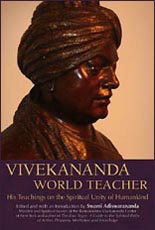"—'Each soul is a star,' wrote Swami Vivekananda, 'and all stars are set in the infinite azure, the eternal sky — the Lord. There is the root, the reality, the real individuality, of each and all. Religion began with a search after some of the stars which had passed beyond our horizon, and ended in finding them all in God, with ourselves in the same place.' God is not only absolute reality but also the sum total of all souls. When this ultimate reality is ignored or forgotten by us, we confront it in our everyday life in the form of sorrow and suffering. When it is recognized, realized, and adored by us, we overcome all laws of material existence.
"The unity of religions is based on direct perception of ultimate reality. The paths are different but the goal remains the same. Even if the whole world becomes convened to one religion or another, it will not enhance the cause of unity. Unity in diversity is the plan of the universe. Unity of religions calls for our paying attention to the basic teachings of all faiths, which provide us with the common ground where we are all rooted. Our scientific age is forcing us to find this common unity. Either we remain in our isolated religious ghettos or we accept the fact of the innate spiritual unity of all faiths.
"Realization of the spiritual unity of humankind begins with ourselves. We may not be able to change the whole world but we can change ourselves. 'For the world can be good and pure only if our lives are good and pure. It is an effect, and we are the means. Therefore let us purify ourselves. Let us make ourselves perfect.' Unless we begin to see God within, we will never see God without. Again, unless we see God in the hearts of all beings, we will never see God inside ourselves. To serve the less fortunate and think of their well-being is a sacred duty of all human beings. This is the basis of all ethics and morality.
"When we discover the Self and look upon every being as the embodiment of that Self, we attain the goal of life and become blessed. Swami Vivekananda tells us that we are not living in the final days of our destiny. We can change our destiny by our knowledge and awareness of our true Self and by our selfless work and spiritual humanism. Vivekananda says, 'The education which does not help the common mass of people to equip themselves for the struggle for life, which does not bring out strength of character, a spirit of philanthropy, and the courage of a lion — is it worth the name?' Regaining our spiritual balance may seem hard or impossible, but Vivekananda assures us that it is attainable by our determined effort.
"Vivekananda's teachings are based on four fundamental principles: nonduality of ultimate reality, divinity of the soul, unity of existence, and harmony of religions. Ultimate reality is always nondual, and the call for overcoming human separateness and human finitude is innate in all beings. Divinity of the soul is the most vital aspect of our lives. We do not become divine by making pilgrimages, bathing in sacred waters, or meticulously performing ceremonies and rituals. The foundation of religion is an implicit faith in our own divinity. Ceremonies and rituals only heighten our faith in this divinity. The difference between a saint and a sinner is that the saint has faith in his saintliness and the sinner has faith in his sins. Unity of existence is the law of the universe. Individual selfishness and greed disrupt this unity and endanger even one's own existence. Harmony of religions is the corollary of the first three principles. When religion loses its spiritual content all dissensions begin — not before that. Unity of religions cannot be promoted merely by lectures and discourses, conferences and workshops. Until we learn the essence of the teachings of all religions, find a common ground, and live according to these principles, harmony and unity will be a far cry."
